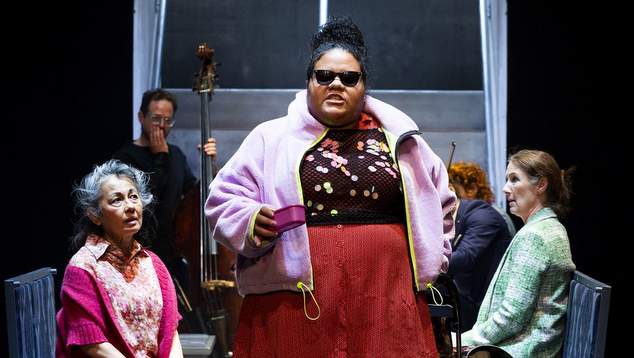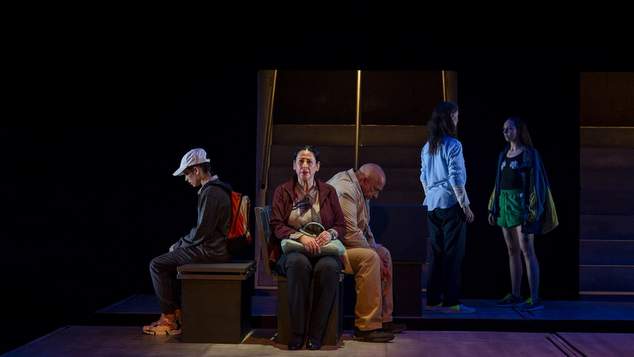
Anthem | State Theatre Centre | Until 16 Feb | ★ ★ ★ ★
In 1998 some of Australia’s most talented writers and a composer came together to create a play that captured the mood of the times. Who’s Afraid of the Working Class was written to celebrate the 10th anniversary of the Melbourne Workers Theatre, and saw Andrew Bovell, Patricia Cornelius, Melissa Reeves, Christos Tsiolkas and Irine Vela collaborating.
Now another twenty years have passed and they’ve joined forces again to create a new work, Anthem, that presents a picture of Australian society on the other side of the new century.
The stage is set with three platforms and a series of benches, concrete stairs lead down to each, the highly adaptable set serves as a variety of locations, predominantly train platforms and carriages, and the occasional office. The work winds together a series of stories and moments, largely set within the carriages of a train.
There’s a common exercise given to budding playwrights and aspiring screenwriters. Catch the train from the furthest station to city and back out to another extremity of the city’s rail network. In Perth a journey from Midland to Fremantle and back again is suggested.
Listen to how people talk, imagine the story of each individual passenger, pay attention to how they dress, notice that the way people speak is filled with slang, stumbles and inconsistencies. Real people don’t speak in the nicely formed sentences that new writers put down on the page.
The train journey is a slice of society, a sampling of different lives, and it’s noticeable that members of the more affluent classes are absent. Author Geoff Ryman tapped into this device with his brilliant website project, turned print novel, 253, which chronicled 253 characters on a London tube train.
With this play Bovell, Cornelius, Reeves, Tsiolkas and Vela offer up a variety of characters plucked straight from everyday Australian life.
There’s the single Mum on benefits, struggling to keep her child under control, a now divorced woman – who has lost her fortune – connecting with her former housekeeper. An older couple from an ethnic background, new migrants from different countries, and an indigenous woman, ignored by the rest but calling for attention.

On stage are a cast of talented character actors who all play a variety of roles. They’re recognisable faces, the actors that you know you’ve seen in many things, but can’t quite place them in anything in particular. All of them deliver admirable performances. Alongside them are two musicians who create a haunting atmosphere.
Maude Davey, Reef Ireland, Ruci Kaisila, Thuso Lekwape, Amanda Ma, Maria Mercedes, Tony Nikolakopoulos, Eryn Jean Norvill, Sahil Saluja, Osamah Sami, Eve Seymour, Carly Sheppard, Jenny M Thomas and Dan Winton bring this world to life.
Through them we follow several separate stories. Surprisingly the play started with an almost separate set emerged above the train station, here we fnd two strangers on the Eurostar from Paris to London discussing world politics.
Down below in Australia we meet Loki, played by Sahil Saluja, who holds up his boss at a 7-Eleven demanding his unpaid wages. His girlfriend Lisa (Norvill), who works at Chemist Warehouse, gets excited about the idea of tracking down corporate bosses who’ve ripped off their employees.
Chi (Ma) recognises Elaine (Davey) a woman she used to clean for, and notes that she never paid her for all her work. Elaine explains that she is now divorced and down on her luck, and tries to makes friends with her former employee.
Three siblings, each with a different father, head into to the city to meet a fourth sibling who has just returned from overseas. One sibling is aboriginal, the other arabic, the third white, and the fourth they meet is African. While it sounds like the opening of a joke where a collection of people walk into a bar, it’s actually an intriguing way of showing the melding of our multicultural country.
The characters a hyper-realistic, almost bordering on caricatures of Australian people, but while the presentation teeters on the edge of believability, it is filled with moments of humour and laugh out loud moments. The language is blunt, filled with coarse words, and the occasional homophobic slur. Often the delivery of the story becomes a multi-character spoken work exercise that effectively builds tension and drama.
Interspersed among the different tales appears Ruci Kaisila, as a busker who sings a series of well known songs closely tied to Australian culture. The busker rattles a tin at the passengers as she delivers her song. Her powerhouse voice blasting across the theatre.
The end of her performances punctuated by a knockout call to “Pay Up!”. Having an indigenous woman oversee the interactions of these newer Australians, and calling for recognition, the symbolism was obvious.
What does Anthem tell us about Australia in 2020? That’s a difficult question to answer, does the play rely too much on stereotypes, or is that who we actually are?
Overwhelmingly this slice of society misses out the inner-city living hipsters, the freeway driving middle class living in suburbia, and the people who have a holiday home in the country. This is a portrait of people who are struggling, people who proud and bold.
Our Prime Minister often speaks about the quiet Australians, recently Barnaby Joyce talked about representing the invisible Australians. This is a play about the everyday Australians, they’ll probably call you a c*** and tell you to f** o**. It’s a marvellously staged work that is worth seeing and debating.
Anthem is playing at the Health Ledger Theatre until Sunday 16th February as part of the Perth Festival.
Graeme Watson is an editor at OUTinPerth. He has a background in writing, dance, theatre, radio and film working as a performer, producer and writer. He is a casual academic at ECU, and writes for a variety of publications. Graeme has been working as a reviewer since 1997. Images: Pia Johnson






